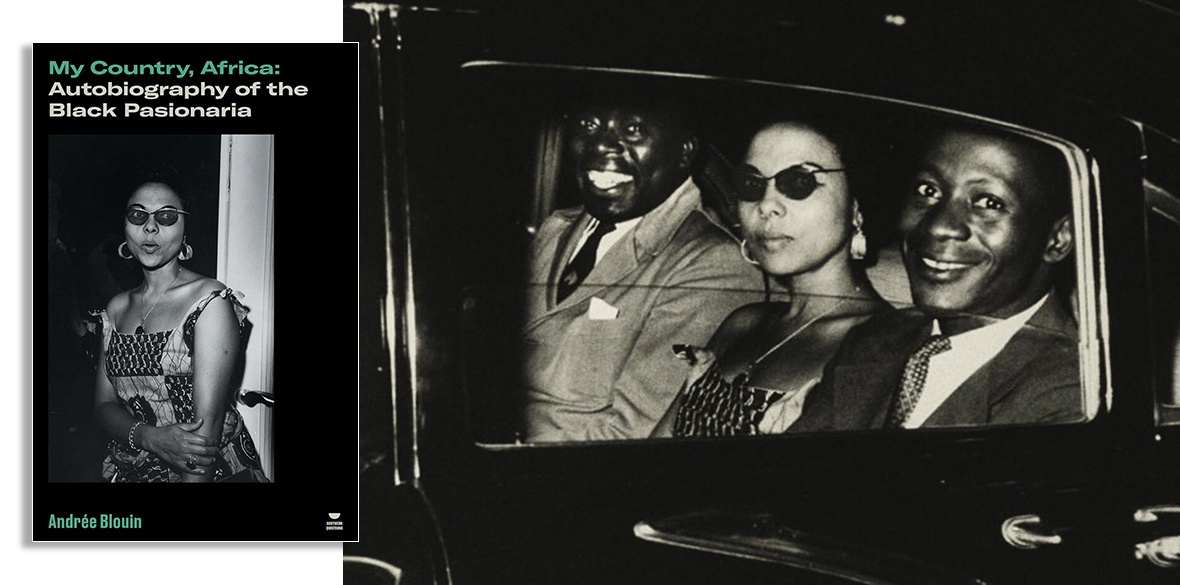This is the last article you can read this month
You can read more article this month
You can read more articles this month
Sorry your limit is up for this month
Reset on:
Please help support the Morning Star by subscribing here
My Country, Africa: Autobiography of the Black Pasionaria
Andree Blouin, Verso, £18.99
THERE is much to unpick from the title alone of My Country, Africa: Autobiography of the Black Pasionaria.
The reference to Africa as a country describes the pan-Africanist philosophy of Andree Blouin, a mixed heritage woman born in the Central African Republic. It is important to understand that Blouin’s support for pan-Africanism — as she appears to interpret it, as a United States of Africa — does not mean she was a socialist. She was not.
Blouin makes it clear in this important book that her priority was fighting for the liberation of the African continent from colonial domination.
The description of Blouin as the “black pasionaria” is adopted from a description of her by the Belgian colonialists of the Democratic Republic of Congo (DRC) as she fought to overthrow the well-documented brutality of their rule. “Pasionaria” refers to Isidora Dolores Ibarruri Gomez, a Spanish communist who fought on the side of the Republicans during the Spanish Civil War of 1936-1939.
It is yet another example of the Eurocentric trait of comparing anything African to a European precedent rather than Africa or anything black being able to stand in its own right. I have always found this deeply patronising and was a little surprised that Blouin adopted the term. I can only assume it was to do with making sure the book got sold more widely in Europe than it otherwise would have done. It is understandable on this basis — although the book has tragically been out of print for decades — having first been published in 1983.
The inability of this book to receive the wider renown that it deserves may perhaps have more to do with a lack of desire to hear about the political activism of an African woman.
Blouin’s mixed heritage came from the liaison between her 14-year old black mother and her 40-year old white French father who visited her mother’s village as a trader. At the age of three Blouin was placed by her father in a convent that catered for mixed heritage girls run by French nuns in Congo-Brazzaville.
The first half of the book describes the brutal treatment Blouin received at the hands of the nuns. It also reveals the deep-seated institutional racism of the French colonial power and how this eventually contributed to Blouin’s growing support for African nationalism.
Eventually Blouin reached Guinea where she became involved in the country’s movement for independence through the pan-African movement Rassemblement Democratique Africain (RDA).
France said Guinea could have its independence but wanted to maintain economic, diplomatic and military control. Blouin became a key activist in the campaign to enable Guinea to win its independence in 1959 and to sever ties with France. RDA leader Sekou Toure was elected as the country’s first president.
We see today those countries that chose to retain ties with their former French rulers are at last booting them out as the inequity of the relationship grows ever more stark.
Blouin’s work alongside the great Patrice Lumumba in the DRC is the dramatic finale to the book. During 1960 Blouin joined the DRC campaign for independence alongside activists Pierre Mulele and Antoine Gizenga in the fight for independence.
The book describes the fascinating inside story of the organising that took place to win independence in 1960 from Belgium, the refusal of the Belgians to leave and the way they, along with the US and the UN, engineered the downfall of Lumumba as the country’s first prime minister and his subsequent murder.
Lumumba had appointed Blouin as his “chief of protocol” and speechwriter on becoming prime minister — demonstrating how important she had been to the fight and eventual winning of independence.
Blouin joined the ancestors in Paris April 1986, aged just 65. It is well past time that her story reached a wider audience.
At this time of heightened awareness by Africans about the need to rid the continent of the last remnants of colonial influence this book should serve to rekindle the fire that is necessary to warm up that continuing fight for liberation.
All readers of this insider’s view of the fight for African independence will be inspired by the contribution made by this important and much neglected woman in the black liberation movement.







